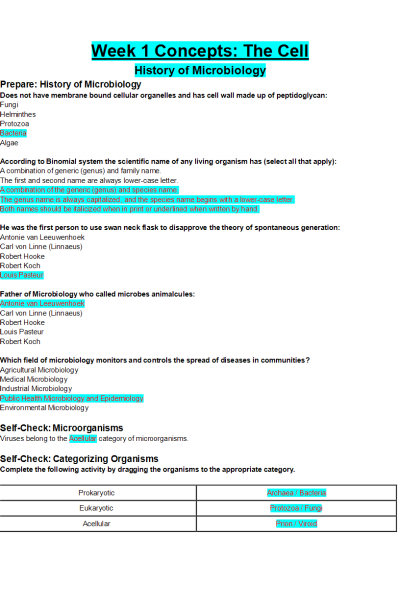BIOS 242 Week 1 Concepts; The Cell
-
$25.00
| Institution | BIOS 242 Fundamentals of Microbiology with Lab - Chamberlain |
| Contributor | Anika Fultz |
Prepare: History of Microbiology
- Does not have membrane bound cellular organelles and has cell wall made up of peptidoglycan:
- According to Binomial system the scientific name of any living organism has (select all that apply):
- He was the first person to use swan neck flask to disapprove the theory of spontaneous generation:
- Father of Microbiology who called microbes animalcules:
- Which field of microbiology monitors and controls the spread of diseases in communities?
Self-Check: Microorganisms
Viruses belong to the Acellular category of microorganisms.
Self-Check: Categorizing Organisms
Complete the following activity by dragging the organisms to the appropriate category.
Self-Check: Microorganism Types
Drag and drop to match the terms to the lower three images.
Self-Check: Cellular Organization
Drag and drop to match the term to the figure.
Self-Check: Branches of Microbiology
Match the following branches of microbiology to their proper description.
Self-Check: Historical Foundations
Leeuwenhoek was able to observe living microorganisms under the microscope he constructed in 1674 (except for acellular infectious agents.) Carolus Linnaeus grouped Leeuwenhoek’s findings into six categories. Complete the concept map by dragging and dropping the terms into the correct areas.
Self-Check: Microscope
Who was the first person to build and use a microscope with magnification of around 300x?
Self-Check: Scientists and their Contributions
Match the following scientists to the appropriate scientific contribution.
Self-Check: Taxonomy
Complete the statements using the correct terms.
Reflect: History of Microbiology
According to Binomial system the scientific name of any living organism has (select all that apply):
- When assigning a scientific name to an organism,
- Koch's postulates are criteria used to establish that
- Which of the following pairs of career descriptions and work tasks is not correctly matched?
- Which field of microbiology monitors and controls the spread of diseases in communities?
- Helminths are .
- Which scientific field is involved in the identification, classification, and naming of organisms?
- Which of the following is a scientific name?
Methods in Microbiology
Prepare: Methods in Microbiology
- In order to identify a microorganism, we must first grow the organism on
- The first microscope with magnification of around 300x was invented by this Dutch Tailor
- The most common student microscope is the
- The purpose of staining is to
Self-Check: Methods Used in Microbiology
Self-Check: Labeling the Student Light Microscope
Identify the four highlighted parts of the microscope by dragging the labels to their correct location.
Self-Check: Microscope Lenses
Most student microscopes use lenses.
Self-Check: Magnification
The magnification of the objective lens with a total magnification of 1000X and an ocular magnification of 10X is .
Self-Check: Types of Microscopy
What type of microscopy would use stains to aid in the observation of these microbes against an illuminated background using visible light?
Self-Check: Types of Microscopy II
What type of microscopy is used to produce image of the surface of the microbes?
Self-Check: Staining
is the difference in the light intensity between the background and the object.
Self-Check: Isolation of Microorganisms
The method involves spreading bacteria across an agar plate with a loop.
Self-Check: Biochemical Identification
Drag and drop each label to its corresponding definition.
Reflect: Methods in Microbiology
- refers to the microscope's ability to show two separate objects as discrete and distinct.
- Agar is an important component of media because .
- Match the following microscope types to the specimen
- A microbiologist inoculates Staphylococcus epidermidis and Escherichia coli into a culture medium both of which grow at 37oC. Following incubation, only the E. coli grows because .
- Agar is a complex polysaccharide that comes from a/an .
- medium distinguishes different types of microorganisms based on an observable change in the colonies or in the medium.
- A microbiologist makes a fixed smear of bacterial cells and stains it with methylene blue. All cells appear blue under the oil immersion lens. This is an example of .
- Mannitol salt agar is selective for .
- The three physical forms of laboratory media are , , and .
Genetics and Genome
Prepare: Genetics and Genome
- Structural genes code for
- RNA molecules differ from DNA molecules because only RNA
Self-Check: Replication of DNA
Self-Check: RNA Synthesis
Self-Check: Translation of mRNA
Self-Check: DNA Mutations
- Read the description of a mutation and drag the correct type of mutation into the box next to the description.
Self-Check: Transduction, Transformation, and Conjugation
- Drag the correct term to complete the sentence.
Reflect: Genetics and Genome
- Each nucleotide is composed of
- The horizontal gene transfer of DNA fragments from the environment into a live competent cell is called .
- Match the following mutations:
- is the production of an mRNA copy from the DNA.
- Bacterial conjugation involves
- Your infant has been diagnosed with severe combined immunodeficiency disease (SCID). Your doctor suggests as a possible cure for the disease.
- The various techniques by which scientists manipulate DNA in the lab are termed .
- The duplication of a cell's DNA is called .
- Groups of three consecutive bases along the DNA of a gene have the code for one .
- The three-base sequence on DNA that codes for an amino acid is called a/an .
- The pathway of gene expression is known as the .
- Match the following:
- The RNA molecules that carry amino acids to the ribosomes during protein synthesis are called .
| Instituition / Term | |
| Term | Uploaded 2023 |
| Institution | BIOS 242 Fundamentals of Microbiology with Lab - Chamberlain |
| Contributor | Anika Fultz |















































